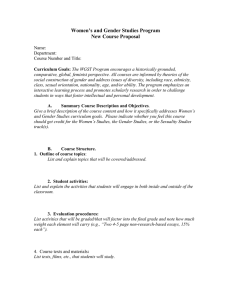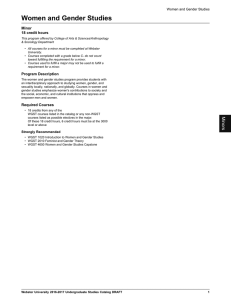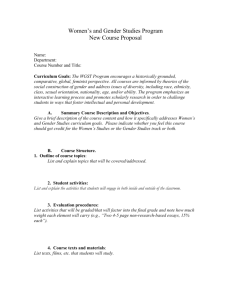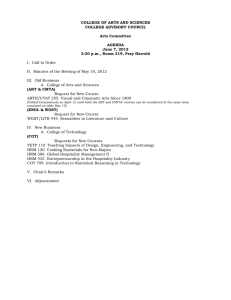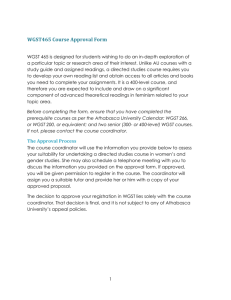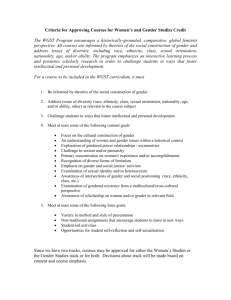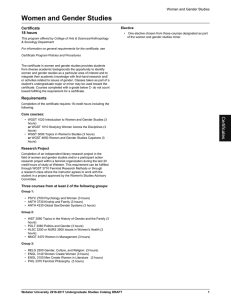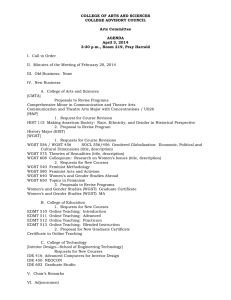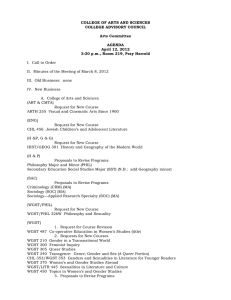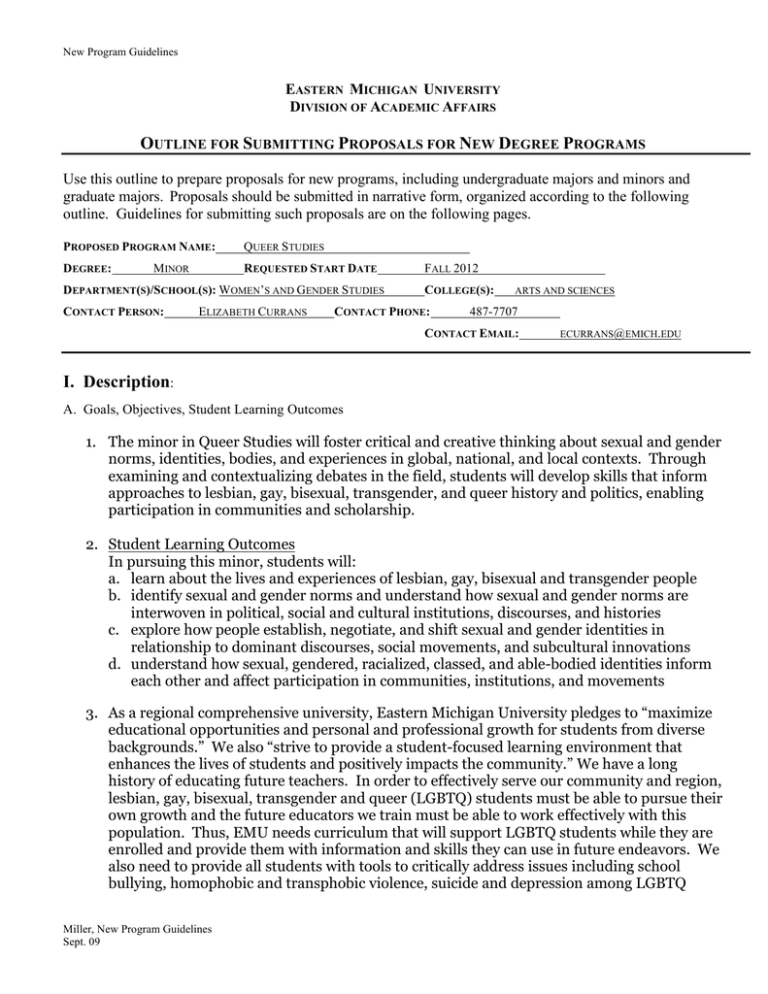
New Program Guidelines
EASTERN MICHIGAN UNIVERSITY
DIVISION OF ACADEMIC AFFAIRS
OUTLINE FOR SUBMITTING PROPOSALS FOR NEW DEGREE PROGRAMS
Use this outline to prepare proposals for new programs, including undergraduate majors and minors and
graduate majors. Proposals should be submitted in narrative form, organized according to the following
outline. Guidelines for submitting such proposals are on the following pages.
PROPOSED PROGRAM NAME:
QUEER STUDIES
DEGREE:
REQUESTED START DATE
MINOR
DEPARTMENT(S)/SCHOOL(S): WOMEN’S AND GENDER STUDIES
CONTACT PERSON:
ELIZABETH CURRANS
FALL 2012
COLLEGE(S):
CONTACT PHONE:
ARTS AND SCIENCES
487-7707
CONTACT EMAIL:
ECURRANS@EMICH.EDU
I. Description:
A. Goals, Objectives, Student Learning Outcomes
1. The minor in Queer Studies will foster critical and creative thinking about sexual and gender
norms, identities, bodies, and experiences in global, national, and local contexts. Through
examining and contextualizing debates in the field, students will develop skills that inform
approaches to lesbian, gay, bisexual, transgender, and queer history and politics, enabling
participation in communities and scholarship.
2. Student Learning Outcomes
In pursuing this minor, students will:
a. learn about the lives and experiences of lesbian, gay, bisexual and transgender people
b. identify sexual and gender norms and understand how sexual and gender norms are
interwoven in political, social and cultural institutions, discourses, and histories
c. explore how people establish, negotiate, and shift sexual and gender identities in
relationship to dominant discourses, social movements, and subcultural innovations
d. understand how sexual, gendered, racialized, classed, and able-bodied identities inform
each other and affect participation in communities, institutions, and movements
3. As a regional comprehensive university, Eastern Michigan University pledges to “maximize
educational opportunities and personal and professional growth for students from diverse
backgrounds.” We also “strive to provide a student-focused learning environment that
enhances the lives of students and positively impacts the community.” We have a long
history of educating future teachers. In order to effectively serve our community and region,
lesbian, gay, bisexual, transgender and queer (LGBTQ) students must be able to pursue their
own growth and the future educators we train must be able to work effectively with this
population. Thus, EMU needs curriculum that will support LGBTQ students while they are
enrolled and provide them with information and skills they can use in future endeavors. We
also need to provide all students with tools to critically address issues including school
bullying, homophobic and transphobic violence, suicide and depression among LGBTQ
Miller, New Program Guidelines
Sept. 09
New Program Guidelines
2
youth, custody cases, domestic partnerships and same-sex marriage, transgender and
transsexual identities, and the history of movements for LGBTQ rights.
In line with the commitments of the College of Arts and Sciences, this minor seeks to
“prepare [students] for service in local, national, and global communities and organizations,
and to instill knowledge of and respect for human diversity in all its many manifestations.”
Along with racial, religious, and classed experiences, gender and sexuality are important
facets of the diversity of our student body and our local, national, and global societies. Key
aspects of this minor include helping student develop the critical and applied tools to
effectively engage in their communities. This minor also supports the College of Arts and
Sciences mission of promoting “active, collaborative, applied, and innovative teaching” by
bringing together faculty from across the college and the university. While the minor will be
housed in Women’s and Gender Studies within Arts and Sciences, core and elective courses
will be taught in English, Communication, Philosophy, Sociology, History, Biology, and the
School of Health and Human Services. The minor represents a collaborative effort among
faculty from these disciplines and schools. Our innovative approach emphasizes student
understanding of Communities, Movements and Identities; Theory and Culture; and
Application and Practice.
The Department of Women’s and Gender Studies is committed “to interdisciplinary
perspectives that investigate the intersections of gender with race, ethnicity, class and sexual
or affectional orientation, in order to ‘embrace the experiences, voices, and concerns of all
those who have been excluded from academic tradition.’” Adding the minor in Queer
Studies fits within the existing mission of the department and will help WGST better address
the needs of sexual and gender minority students.
B. Program
1. Required courses:
WGST 202: Introduction to Gender and Sexuality Studies
WGST 305: Queer Studies
Electives:
Students should take at least one course from each of the following lists but no more
than two from each list, for a total of 15 credits. Please note that only one course with the
same non-WGST prefix will count toward the minor.
A. Movements, Identities and Communities
CTAC/WGST 265: Communicating LGBT Community
HIST/WGST 325: History of Sexuality
HIST 415: Sexual Communities in American History
SOCL/WGST 344: Sociology of Gender
B. Theory and Culture
CHL/WGST 353: Genders and Sexualities in Literature for Younger Readers
CRTW 335/WGST 340: Transgenre
LITR/WGST 445: Sexualities in Literature and Culture
PHIL/WGST 3xx: Philosophy and Sexuality
C. Application and Practice
Miller, New Program Guidelines
Sept. 09
New Program Guidelines
3
BIO/WGST 269: Biology of Sex and Gender
HLED 130: Healthy Sexuality
PSY 240: Psychology of Sex
SWRK/WGST 462: Practice with Lesbian, Gay, Bisexual and Transgender Persons
2. New courses:
CHL/WGST 353: Genders and Sexualities in Literature for Younger Readers
LITR/WGST 445: Sexualities in Literature and Culture
PHIL/WGST 3xx: Philosophy and Sexuality
WGST 305: Queer Studies
WGST 340: Transgenre
Existing courses:
CTAC/WGST 265: Communicating LGBT Community
BIO/WGST 269: Biology of Sex
HIST/WGST 325: History of Sexuality
HIST 415: Sexual Communities in American History
HLED 130: Healthy Sexuality
PSY 240: Psychology of Sex
SOCL/WGST 344: Sociology of Gender
SWRK/WGST 462: Practice with Lesbian, Gay, Bisexual and Transgender Persons
WGST 202: Introduction to Gender and Sexuality Studies
3. The minor will be delivered on campus, with the exception of WGST 202 sections already
offered online. Courses will primarily be scheduled during the day, but some evening
classes may be offered.
4. A typical program of study:
WGST 202: Introduction to Gender and Sexuality Studies
WGST 305: Queer Studies
A. CTAC/WGST 265: Communicating LGBT Community
HIST/WGST 325: History of Sexuality
B. CHL/WGST 353: Genders and Sexualities in Literature for Younger Readers
PHIL/WGST 3xx: Philosophy and Sexuality
C. PSY 240: Psychology of Sex
5. Women’s and Gender Studies will administer the program.
6. The minor will require 21 undergraduate credit hours.
C. Admission
1. Admission to the minor will not have additional requirements beyond those required for
admission to EMU.
2. There will not be conditional admission to the program.
Miller, New Program Guidelines
Sept. 09
New Program Guidelines
4
D. Projections
1. We project that the first year the minor is offered that 10-15 students will enroll and that in
following years an addition 5-10 students will enroll, for a projected total of 30 students in
the first three years.
2. Up to 20 sections of WGST 202 are offered during fall and winter semesters, with up to 8
additional sections offered during spring and summer. WGST 305 will be offered each fall
semester.
Elective courses will be scheduled as follows:
CTAC/WGST 265:
every semester
CTRW 335/WGST 340:
every year
HLED 130:
every year
LIT/WGST 445:
every year
PSY 240:
every year
SOC/WGST 344:
every year
SWRK/WGST 462:
every year
PHIL/WGST 3xx:
every other year
CHL/WGST 353:
every other year
HIST/WGST 325:
every other year
BIO/WGST 269:
every few years
HIST 415:
infrequently
HLED 460:
infrequently
II. Justification/Rationale
A. LGBTQ (Lesbian, Gay, Bisexual, Transgender and Queer) Studies is a growing field. As of
December 2011, there are currently six majors (Brown, Hobart and William Smith, Ohio
State, Miami University (Ohio), University of Chicago, and Wesleyan) and at least 40
colleges and universities offering minors
(http://people.ku.edu/~jyounger/lgbtqprogs.html). Many of these programs are part of
Women’s and Gender Studies departments. EMU’s Women’s and Gender Studies has a long
history. Established in 1975, we offered the first minor in Michigan and were among the
first institutions to offer undergraduate and master’s degrees in the US. We are currently
the only stand-alone MA program in the state. Adding a minor in Queer Studies will
continue our leadership in the region and keep us up to speed with other programs
nationally.
In 2001, Newsweek ranked EMU number eighteen among LGBT-friendly campuses
nationwide (http://www.thedailybeast.com/newsweek/features/college-rankings/2011/gayfriendly.all.html). This ranking was based in large part on our score of 4.5 out of 5 from
Campus Pride, a national organization that rates campuses based on a number of criteria
including the presence of a resource center, supportive staff and faculty, activities, and
curriculum (http://www.campusclimateindex.org/details/premium.aspx?ID=99). One of
the key components we are missing is curriculum dedicated to LGBTQ concerns and
experiences.
In January 2012 Mary Larkin, Lesbian, Gay, Bisexual and Transgender Resource Center
Program Director, conducted a survey of current and prospective students, alumna, faculty
Miller, New Program Guidelines
Sept. 09
New Program Guidelines
5
and staff regarding a potential minor addressing LGBTQ issues. Out of 85 responses
(including 2 prospective students, 53 current students, 25 faculty/staff, and 5 alumna),
40.6% stated they would declare this as their minor, 26.6% stated they might declare this as
their minor, and 32.8% stated they would be interested in taking some of the classes, but
would not declare. None of the people surveyed indicated that they have no interest. This
suggests that there is enthusiasm and support for this minor and the new courses that will
be added to the curriculum.
This minor complements the Human Sexuality minor that was recently added to the Arts
and Sciences curriculum. By focusing specifically on sexual and gender minority
populations and the societal norms that treat them as deviant, the Queer Studies minor has
a specific focus different from the broad focus on human sexual behavior in the existing
minor.
B. The University of Michigan offers a minor through their Women’s Studies Department.
Their minor only requires five classes and only has one core requirement: either
Introduction to LGBTQ Studies or Sexuality in Western Culture. Our minor will provide a
greater diversity of courses, and will require students to take one core course in
LGBTQ/Queer Studies and one that addresses the broader field of Gender and Sexuality
Studies. In this way, our minor will be more comprehensive. Our framing of the
curriculum as Queer Studies emphasizes a link between theory and practices that is in line
with leaders in the field such as University of Minnesota’s Women’s, Gender, and Sexuality
Studies department. In addition, EMU enrolls a greater number of students from Michigan
and therefore will better serve our region.
C. Letters are attached from Linda Pritchard, Department Head of Women’s and Gender
Studies; Mary Larkin, LGBT Resource Center Program Coordinator; Anders Linde-Laursen,
Department Head of Sociology, Anthropology and Criminology; Richard Nation, Interim
Department Head of History and Philosophy; Marianne Laporte, Department Head of
Biology; and Mary Ramsey, Department Head of English.
III. Preparedness
A. Assistant Professor Elizabeth Currans (WGST) is facilitating this minor. Dr. Currans
received her Ph.D. in Religious Studies with a graduate emphasis in Women’s Studies from
UC Santa Barbara, where a similar minor was implemented during her tenure as a graduate
student. She served as a teaching assistant for the first Introduction to LGBTQ Studies
course taught at UC Santa Barbara and has since taught that course herself and has designed
additional courses in LGBTQ Studies for UC Santa Barbara, The College of William & Mary,
and EMU. Her research also addresses sexuality and gender. She has published articles
including “Instituting Heteronormative Belief in the Law: The Case of California’s
Proposition 22” and, with Julianne Cordero, “Gender, Sexuality, and the Balance of Power:
Continuity and Divergence in Native American Worldviews.” An additional article,
“Claiming Deviance and Honoring Community: Creating Resistant Spaces in U.S. Dyke
Marches” is scheduled to be published by Feminist Formations in April 2012. A book
manuscript exploring gender and sexuality in contemporary public protests is under
contract with University of Illinois Press. During fall semester 2011, she convened a seminar
through the Faculty Development Center funded by the Provost’s ABBR Program
Development Initiative to cultivate additional courses for the minor. She will be teaching
Miller, New Program Guidelines
Sept. 09
New Program Guidelines
6
WGST 305: Queer Studies and is among the faculty who teach WGST 202: Introduction to
Gender and Sexuality Studies.
Assistant Professor Amanda Allen (CHL), who will teach CHL/WGST 353: Genders and
Sexualities in Literature for Younger Readers, specializes in Cold War era adolescent girl
romance novels including the role of the homoerotic gaze.
Associate Professor Abby Coykendall (LITR), who will teach some sections of WGST/LITR
445: Sexualities in Literature and Culture, specializes in eighteenth-century literature,
cultural studies, sexuality and gender studies, film, the novel and narrative theory, and
literary criticism. She is currently finishing a co-edited book collection entitled
Heteronormativity and the Eighteenth Century and completing a monograph on
eighteenth-century effeminacy entitled Queer Masculinities.
Assistant Professor Rob Halpern (CRTW), who will teach CRTW 335/WGST 340:
Transgenre, is the author of several books of poetry which explore sexuality among other
themes, including Rumored Place, Disaster Suites, Music for Porn, and, with Taylor Brady,
Snow Sensitive Skin. His essays addressing sexuality, poetry, and critical theory appear in a
range of journals and anthologies. He’s also founding member of the Nonsite Collective, an
interdisciplinary collaborative.
Assistant Professor Peter Higgins (PHIL), who will teach PHIL/WGST 3xx: Philosophy and
Sexuality, specialized in contemporary social and political philosophy and feminist theory.
In addition to publications in these areas, he has one publication directly related to the
philosophical aspects of sexuality: “Sexual Disorientation: Moral Implications of Gender
Norms,” in Feminists Contest Politics and Philosophy.
Assistant Professor Melissa Jones (LITR), who will teach some sections of WGST/LITR 445:
Sexualities in Literature and Culture, teaches classes in Renaissance literature and in
Gender and Sexuality Studies. Her current book project, Early Modern Pornographies: For
Her Pleasure, examines the ways that women participated in the poetics of early modern
erotica, often in “perverse” defiance of Renaissance and contemporary norms of identity and
sexual practice.
Associate Professor John McCurdy (HIST), who teaches HIST/WGST 325: The History of
Sexuality and HIST/WGST 415: Sexual Communities in America, scholarship is in the area
of early American gender and sexuality. His monograph Citizen Bachelors: Manhood and
the Creation of the United States address connections between sexuality and masculinity
and he has written several articles and book reviews in major historical journals on both
sexuality and gender.
Professor Michael Tew (CTAC), who will teach CTAC/WGST 265: Communicating LGBT
Commmunity, has teaching and research interests in the areas of Public Sphere
Communication, Queer Studies, and Communication Pedagogy. Dr. Tew’s research in the
communication discipline uses rhetorical and critical methods to investigate political
communication, LGBT community issues, and public information/influence campaigns.
Most faculty teaching required and elective courses are tenured or tenure-track.
Miller, New Program Guidelines
Sept. 09
New Program Guidelines
7
B. The library has had a designated fund for a number of years through which LGBTQ
materials are selected by librarians with a variety of subject specializations. Therefore, the
library already has a diverse, multidisciplinary collection of monographs and periodicals
that support undergraduate research in the minor, and will continue to build on that
collection as resources allow. A number of films have been purchased to support WGST
202, the foundation course in the minor, which may also be of use in some of the upper level
cross listed courses.
The library currently subscribes to a number of databases that support many of the
academic disciplines that will be cross listing courses, and also to Gender Watch, which will
be of particular use to students of LGBTQ Studies. Other monographs that support the
program are available from libraries across the state with strong gender and sexuality
collections, including MSU and Wayne State, through the MelCat service. Access to journals
not owned by EMU is available via the library's interlibrary loan service.
C. Existing classrooms and other facilities are adequate.
D. Many necessary courses already exist. Faculty in other departments and schools have solid
credentials and experience. (See A. for more information about faculty.)
E. Informal marketing of the new minor has already begun. The LGBT Resource Center has
been telling students about the proposed minor and circulated a survey regarding interest
(see section II.A. for more information about the survey). Faculty have begun discussing the
minor in their classes. Numerous students have emailed or met with Professor Currans
about the minor. The Women’s and Gender Studies student staff members have also
received numerous questions from students. Women’s and Gender Studies held a reception
on March 13th to advertise the minor and the Queer Studies class which will be offered in fall
semester 2012.
As long as the minor is approved, formal marketing will begin at the end of winter semester
with an informational gathering for students, staff and faculty. Professor Currans will also
distribute an announcement with an outline of required courses via email to offices and
departments on campus. A flyer will also be produced to be distributed in offices all over
campus.
IV. Assessment/Evaluation
Formal departmental-level assessment is being done for the WGST major. The minor will be
evaluated through Curriculum Committee review of the courses in relation to Student Learning
Outcomes. The Exit Interview for graduating seniors will include specific questions about
courses in the minor, with follow-up questions to address preparation of students for work
and/or further education.
V. Program Costs
At this time, the Queer Studies minor will not require any additional resources. Existing faculty
will teach courses within their home departments that will be cross-listed with WGST. Adjuncts
will not be required to cover new courses. Elizabeth Currans was hired in 2010 for the
expressed purpose of facilitating the creation of this minor.
Miller, New Program Guidelines
Sept. 09
8
New Program Guidelines
VI. Action of the Department/College
1. Department/School (Include the faculty votes signatures from all submitting departments/schools.)
Vote of faculty:
For
Against
(Enter the number of votes cast in each category.)
I support this proposal. The proposed program can
College or University resources.
cannot
Department Head/School Director Signature
Abstentions
be implemented without additional
Date
2. College/Graduate School (Include signatures from the deans of all submitting colleges.)
A. College.
I support this proposal. The proposed program can
College without additional University resources.
cannot
College Dean Signature
be implemented within the affected
Date
B. Graduate School (new graduate programs ONLY)
Graduate Dean Signature
Date
VII. Approval
Associate Vice-President for Academic Programming Signature
VIII. Appendices
Miller, New Program Guidelines
Sept. 09
Date
(DJOHPDLO
(DJOHPDLO
DVDUDK#HPLFKHGX
SURSRVHGPLQRULQ&ULWLFDO6H[XDOLW\DQG*HQGHU6WXGLHV
)URP $QJHOD6DUDKDVDUDK#HPLFKHGX!
:HG$SU$0
6XEMHFW SURSRVHGPLQRULQ&ULWLFDO6H[XDOLW\DQG
*HQGHU6WXGLHV
7R $QJHOD6DUDKDVDUDK#HPLFKHGX!
)URP'HQQLV%HDJHQGEHDJHQ#HPLFKHGX!
7R(OL]DEHWK&XUUDQVHFXUUDQV#HPLFKHGX!
&F.DWH0HKXURQNPHKXURQ#HPLFKHGX!
6HQW7XHVGD\$SULO30
6XEMHFW5HSURSRVHGPLQRULQ&ULWLFDO6H[XDOLW\DQG*HQGHU6WXGLHV
$IWHUQRRQ(OL]DEHWKVRUU\IRUWKHGHOD\RQWKLVPDWWHU0\EDG-XVWWKLVDIWHUQRRQ,
KDG&07$FRPPXQLFDWLRQIDFXOW\UHYLHZWKHPDWWHUDQGPDNHDUHFRPPHQGDWLRQ
,QGHHGWKH&07$IDFXWO\KDYHXQDQLPRXVO\YRWHGWRLQFOXGH&07$:*67DV
SDUWRIWKHPLQRU
,IWKHUHLVVRPHWKLQJIXUWKHUWKDW,QHHGWRGRDWWKLVHQGOHWPHNQRZ'HQQLVa
)URP(OL]DEHWK&XUUDQVHFXUUDQV#HPLFKHGX!
7RGHQQLVEHDJHQGHQQLVEHDJHQ#HPLFKHGX!
&F.DWH0HKXURQNPHKXURQ#HPLFKHGX!
6HQW7KXUVGD\)HEUXDU\30
6XEMHFWSURSRVHGPLQRULQ&ULWLFDO6H[XDOLW\DQG*HQGHU6WXGLHV
+HOOR3URI%HDJHQ
,DPLQWKHSURFHVVRIFRPSOHWLQJWKHSDSHUZRUNIRUDPLQRULQ&ULWLFDO*HQGHU
DQG6H[XDOLW\6WXGLHVZKLFKZLOODGGUHVVOHVELDQJD\ELVH[XDOWUDQVJHQGHU
DQGTXHHULGHQWLWLHVDVZHOODVWKHJHQGHUDQGVH[XDOLGHRORJLHVDQG
IUDPHZRUNVWKH\DUHHPEHGGHGZLWKLQ7KLVPLQRUZLOOEHKRXVHGLQ:RPHQ
V
DQG*HQGHU6WXGLHVEXWZLOOLQFOXGHFRXUVHVIURPPDQ\GHSDUWPHQWVLQWKH$UWV
6FLHQFHVDQGDIHZLQ+HDOWKDQG+XPDQ6HUYLFHV7KHIXOOGHVFULSWLRQRI
WKHSURSRVHGFXUULFXOXPLVEHORZDQG\RX
OOQRWLFHWKDW&RPPXQLFDWLQJ/*%7
&RPPXQLW\LVDPRQJWKHHOHFWLYHV,
GOLNHWRLQFOXGHLQWKHPLQRU
KWWSVPDLOHPLFKHGX]LPEUDKSULQWPHVVDJH"LG [LP (DJOHPDLO
,ҋPKRSLQJWKDW\RXFDQDVN\RXUIDFXOW\LQSXWFRPPLWWHHZKHWKHUWKH\ҋUHZLOOLQJ
WRKDYHWKLVFRXUVHLQFOXGHGLQWKHPLQRU,DOVRZDQWHGWRILQGRXWLI\RXWKLQN
WKHUHZLOOEHDQ\SUREOHPDWLFRYHUODSVZLWK\RXUFXUULFXOXPDQGLIQRWLI\RX
OO
EHZLOOLQJWRZULWHDOHWWHULQVXSSRUWRIWKHPLQRU
,SODQWRGHOLYHUDOORIWKHSDSHUZRUNLQFOXGLQJOHWWHUVRIVXSSRUWWR$VVRF'HDQ
.DWH0HKXURQRQ$SULOVWVRWKDWLWZLOOEHUHDG\WRSUHVHQWWRWKH&$&
PHHWLQJVLQ$SULO
5HTXLUHGFRXUVHV
:*67,QWURGXFWLRQWR*HQGHUDQG6H[XDOLW\6WXGLHV
:*67;;4XHHU6WXGLHV
(OHFWLYHV
6WXGHQWVVKRXOGWDNHRQHFRXUVHIURPHDFKRIWKHIROORZLQJOLVWV7ZR
DGGLWLRQDOFRXUVHVIURPDQ\RIWKHVHOLVWVZLOOFRPSOHWHWKHUHTXLUHGFUHGLWV
3OHDVHQRWHWKDWRQO\RQHFRXUVHZLWKHDFKQRQ:*67SUHIL[ZLOOFRXQWWRZDUG
WKHPLQRU
0LQRULQ&ULWLFDO6H[XDOLW\DQG*HQGHU6WXGLHV
$0RYHPHQWV,GHQWLWLHVDQG&RPPXQLWLHV
&7$&:*67&RPPXQLFDWLQJ/*%7&RPPXQLW\
+,67:*67+LVWRU\RI6H[XDOLW\
+,67:*676H[XDO&RPPXQLWLHVLQ$PHULFDQ+LVWRU\
62&/:*676RFLRORJ\RI*HQGHU
%7KHRU\DQG&XOWXUH
&+/:*67[[*HQGHUVDQG6H[XDOLWLHVLQ/LWHUDWXUHIRU<RXQJHU
5HDGHUV
&57::*67[[1HHGWLWOH5RE+DOSHUQҋVFODVV
/,75:*67[[6H[XDOLWLHVLQ/LWHUDWXUHDQG&XOWXUH
3+,/[[:*67[[3KLORVRSK\DQG6H[XDOLW\
&$SSOLFDWLRQDQG3UDFWLFH
%,2:*67%LRORJ\RI6H[DQG*HQGHU
+/('+HDOWK\6H[XDOLW\
+/('&RQFHSWVLQ6H[XDOLW\(GXFDWLRQ
36<3V\FKRORJ\RI6H[
6:5.:*673UDFWLFHZLWK/HVELDQ*D\%LVH[XDODQG7UDQVJHQGHU
3HUVRQV
KWWSVPDLOHPLFKHGX]LPEUDKSULQWPHVVDJH"LG [LP

